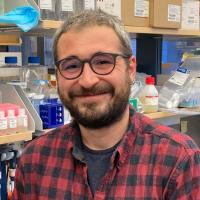TL1 Trainees
The TL1 Training Programs provide trainees with additional research training to prepare for a precision medicine research career.
Current TL1 Trainees
Postdoctoral Fellow Program
Ugur Akcan, PhD
- Postdoctoral Research Fellow, Neurology
Project: Role of RXRa for developing basal ganglia encephalitis

Ashley Brown, PhD
- Postdoctoral Research Fellow, Biological Sciences
Project: Treatment of High CBS Expressing Ovarian Cancers via Ferroptosis Induction

Olivia Rifai, PhD
- Postdoctoral Research Fellow, Neurology
Project: Regulatory T cell Therapy in Amyotrophic Lateral Sclerosis

Yinjun Zhao, PhD
- Postdoctoral Research Fellow, Biostatistics
Project: Advanced Methodologies for Integrating Mixed-Type Phenotypes for Mental Health

Doctoral Student Program
Maximilian Cabaj
- Doctoral Candidate, Genetics and Development
Project: Investigating disease mechanisms of two Pum1 related disorders in mouse models

Emily Cambre
- Doctoral Candidate, Pharmacology
Project: Impact of Early Life SSRI Exposure on Adolescent Motivation

Kelia Human
- Doctoral Candidate, Biomedical Engineering
Project: Point of care liquid biopsy device for screening of RAS mutations using cfDNA

Elly Kipkogei
- Doctoral Candidate, Biostatistics
Project: Assessing Treatment Efficacy in Contaminated Randomized Clinical Trials

David Lopez Veneros
- Doctoral Candidate, Nursing
Project: Machine learning & social determinants of physical activity in gender minorities

Catherine Lucey
- Doctoral Candidate, Environmental Health Sciences
Project: Systemic Toxicity of Drinking Water Uranium in a Mouse Model

Victoria Nguyen
- Doctoral Candidate, Social Work
Project: Social-Ecological Determinants of Child and Adolescent Mental Health Disorders

Kevin Patterson
- Doctoral Candidate, Environmental Health Sciences
Project: Uranium nephrotoxicity and metabolomics in Native American communities

Sabrina Phanor
- Doctoral Candidate, Genetics and Development
Project: Deficiency in Pumilio2 may play a role in cerebellar dysfunction

Anna-Liisa Sepp
- Doctoral Candidate, Biomedical Engineering
Project: Patient-specific optimization of T cells for solid tumor infiltration

Graduates of the TL1 Training Programs
- Casey Ager, PhD: Discovery and Validation of New Regulatory T Cell Targeting Strategies in Cancer
- Dana Alessi, Cell and Molecular Biology: Integrated Program in Cellular, Molecular and Biomedical Studies
- Medini Annavajhala, PhD: Microbial metagenomic pathways contributing to chronic inflammation in patients with HIV
- Hilary Armstrong, Epidemiology: Analyses from the Multi-Ethnic Study of Atherosclerosis (MESA)
- Maria Avrutsky, Cell and Molecular Biology: Pharmacological Modulation of tau in Embryonic Stem Cell-derived Neurons
- Danielle Baum, Nutritional and Metabolic Biology: Polymorphic Region in Type I Diabetes Using Human Stem Cells
- Andrew S Beenken, MD, PhD: Structural and biochemical basis for the mechanism of human mutations in megalin and cubilin
- Montina Befus, Epidemiology: Spatial clusters of bacteremia related hospital admissions and their impact on clinical complication
- Ramsey Bekdash, Pharmacology: Human iPSC Modeling of Autism for Developing New Therapeutics
- Joseph Belloir, Nursing: Precision Sleep Health in Transgender and Nonbinary Adults
- Sonya Besagar, MD Program: Frequency and Yield of Genetic Testing in Neonates with Congenital Heart Disease
- Nicole Blumenfeld, Biomedical Engineering: Next-Generation Sequencing on a Chip
- Margaret Bogardus, Medicine: Evaluating Immune Biomarkers in Melanoma using Multiplex Immunohistochemistry
- Mary Boland, Biomedical Informatics (DBMI): Systems-Level Approach to Understand the Effects of Prenatal/Perinatal Seasonal Exposures
- Lisa Bonsignore-Opp, Medicine: Beat the Clock: Variable Anesthesia Times with Casting for Early Onset Scoliosis
- Darius Bordbar, MD Program: Development of a Novel Biomarker to Predict Response to Immunotherapy in Glioma
- Lia Boyle, Cellular and Molecular Physiology & Biophysics: A mutation-specific approach to understanding KIF1A Associated Neurological Disorder
- Anne Bozack, Environmental Health Sciences: Epigenetic Effects of Arsenic Exposure and Effect Modification by Nutritional Status
- Eric Bryant, Biological Sciences: A Rapid and Cost-Efficient Strategy to Develop a Precision Therapy for Cancers Overexpressing HLTF
- Eric Buss, MD: Physiological role of presynaptic HCN1 in parvalbumin+ GABAergic interneurons and modulation in epilepsy
- Sarah Canetta, Neurobiology and Behavior: Type III Nrg1-erbB Signaling in Nociception
- Julie Choe, Sociomedical Sciences: Bridging the Technology Divide - Translational Science and Technological Innovation in Medicine
- Ana Costa, PhD, Pathology & Cell Biology: Mechanisms Underlying Lipidomic Changes in Major Depressive Disorder in Plasma, Saliva and Human iPSC-Derived Neurons
- Jennifer Crowe, Pathology & Cell Biology: Non-Catalytic Functions of DNA-PK in DNA repair and tumorgenesis
- Christopher DeAllie, Medicine: Does Higher Severity Cobb angle in Cerebral Palsy patients increase need for Respiratory Assistive Aids?
- Christine DeForge, Nursing: Exploring decisional conflict and symptom phenotypes among bereaved ICU surrogate decision makers
- Annina DeLeo, Cell and Molecular Biology: MicroRNA Regulation of the switch from Qiuescent to Activated cell state in Adult Neural Stem Cells
- Zhi-De Deng, Electrical Engineering: Field Shaping and Coil Design for Transcranial Magnetic Stimulation (TMS)
- Dallin Dressman, Pharmacology: Examining genetic variability in innate and adaptive immune cells in the context of Alzheimer's disease
- Sarah Dugger, Genetics and Development: Hitting the Bullseye: Identifying Targeted Treatments for Hnrnpu-related Epilepsy Using In Vivo and In Vitro Disease Models
- Roxanne Dutia, Nutritional and Metabolic Biology: Hypothalamic Melancontin Regulation of Energy Balance and Metabolism
- Christina Eckhardt, MD: Establishing a DNA methylation-based smoking index that classifies cumulative tobacco smoke exposure and predicts lung function decline.
- Shannon Fernandez-Ledon, MD Program: Evaluating the tumor microenvironment in pediatric hepatocellular carcinoma
- Jennifer Ferris, PhD, MPH: Improving Risk Prediction and Early Detection of Ovarian Cancer
- Trevor Fidler, MD: Mechanisms of Increased Cardiovascular Disease in Patients with Clonal Hematopoiesis
- Rachel Field, Biomedical Engineering: Implantable Device for the Capture of Early-Stage Cancer Cells Present in Blood Vessels
- Rachel Field, Biomedical Engineering: Delivery Mechanisms of Replacement Dopaminergic Cells for Parkinson’s Disease Patients
- Allana Forde, Epidemiology: Impact of Social Stressors on Chronic Disease Risk in Black Ethnic Groups
- Victor Gamarnik, Biomedical Engineering: Multimodal Assessment of Left Ventricular Dysfunction Using Ultrasound and MRI-based 3D Strain Estimation
- Robyn Gartrell, MD: Defining Critical features of the Immune Microenvironment in Neuroblastoma
- Yevgeniya Gartshteyn, MD: Platelet bound complement activiation products as biomarkers for cardiovascular risk and response to aspirin in SLE
- Corey Garyn, Genetics and Development: A precision medicine approach to graft conditioning for autologous hematopoietic stem cell transplantation
- Sarah Gibeley, Nutritional and Metabolic Biology: Investigating TM6SF2 Regulation Of Hepatic And Plasma Lipids In iPSC-Derived HLCS
- Jordan Gipe, MD Program: The role of NFkappaB signaling in rotator cuff tendinopathy
- Ambar Grijalva, Nutritional and Metabolic Biology: Role of Autophagy in Regulating Lipid Metabolism in Adipose Tissue Macrophages
- Jacqueline Gunther, Biomedical Engineering: Using Diffuse Optical Tomography to Monitor Tumor Progression During Neoadjuvant Chemotherapy
- Erin Harelton, Pharmacology: TASK-1 in Arrhythmogenesis Downstream of PAF Signaling
- Samuel Hayward, Genetics and Development: Genetic Interaction Screening within the Human DNA Damage Response Pathway
- Millie Hepburn-Smith, Nursing: Reduction of Stroke Risk in Minority Women
- Ryo Higuchi, Nutritional and Metabolic Biology: The Role of the Actin Cytoskeleton on Segegragtion of Aging Determinants and Lifespan in Budding Yeast
- Cristin M. Holland, PhD, OTR/L: Relationships of Maternal Hypertension and Fetal and Infant Reactivity
- Alexander Hsieh, Biomedical Informatics (DBMI): Investigating the Functional Consequence of Noncoding Variants in the Context of Human Tissue and Disease
- Dantong Huang, Biomedical Engineering: Development of Patient-Specific Hepatocyte Spheroids for Disease Modeling and Drug Screening
- Ronald Instrella, Biomedical Engineering: Evaluating Error in Infant Metabolic Brain Signatures for MR Spectroscopy
- Catherine A Jennings, MD Program: Adolescent Genetic Testing for Adult Onset Cancer Conditions Interview Study
- Allan Just, Environmental Health Sciences: A Molecular Epidemiologic Study of Endocrine Disruptors and Pediatric Asthma
- Linda Kahn, Epidemiology: Allostatic Load and Semen Quality
- Matko Kalac, MD, PhD: Development of a Novel, Anti-CD70 Based Platform for the Treatment of Peripheral T-cell Lymphomas
- Nowai Keleekai, Nursing: Study of Mental Health Services of an HIV-positive Incarcerated Population
- Atlas Khan MSc, MPhil, PhD: Polygenic Risk Prediction for Kidney Disease
- Kristen Klemenhagen, Neurobiology and Behavior: Developmental Role of the 5-HT1A Receptor in Establishing Adult Anxiety Behavior
- Kimberly Komatsubara, MD: Personalized Medicine in the Adult Experimental Therapeutics Cancer Clinic at Columbia University Medical Center
- Brahma Kumar, Cell and Molecular Biology: Mechanisms of Memory T cell Retention to the Lung in Humans
- Sara E. Landers, Social Work: Ecological Momentary Assessment of Adolescents' Stress, Social Context, and Risk Behavior
- Annie Lee, Biostatistics: Methods for Age-specific Penetrance Estimate of LRRK2 Mutations on the risk of Parkinson’s Disease Incorporating Personalized Characteristics
- Jorge Luna, Epidemiology: Acute and Chronic Infectious Predictors of Stroke
- Purnema Madahar, MD: Genomic Characterization and Clinical Phenotypes of Patients with Idiopathic Pulmonary Fibrosis
- Rachel Madley, Microbiology and Immunology: A TCR-transgenic Personalized Immune Mouse Model to Study Autoreactive T-cell Selection
- Ann Madsen, Epidemiology: Common Cause Model for Genetic Epidemiology and Risk-Factor Epidemiology: Laying the Foundation for Integration
- David Malito, Neurobiology and Behavior: Calcium Channel Mutations in Heart Arrythmias and Autism
- Stephen Marcott, Medicine: Neuroinflammation and Imminent Suicide Risk in Young Adults
- Melanie Mayer, Biostatistics: Evaluating External Validity of Observational Studies for Targeted Interventions
- Russell McBride, Epidemiology: Genetic Similarities in DNA Repair Polymorphisms between BRCA2 and HNPCC syndromic cancer families
- Erin I. McDonnell, Biostatistics: Machine Learning Methods for Constructing Cross-Domain Biomarker and Clinical Symptom Networks
- Sarah McLarnan, Environmental Health Sciences: Gestational Exposure to PAHs and Mitochondrial Damage
- Arthur Mikhno, Biomedical Engineering: Non-Invasive and Cost Effective Quantification of Positron Emission Tomography Data
- Shazia Mitha, Nursing: Phenotyping Cardiotoxicity in Breast Cancer
- Joshua E. Motelow, MD, PhD: Understanding the Contribution of Genic Sub-Region Intolerance to Epilepsy Severity
- Jordan Nestor, MD: The Return and Integration of Genomic Results into Clinical Nephrology
- Stacia Nicholson, PhD: Extracellular Vesicles in Environmental Epidemiology Studies of Alzheimer’s Disease as it Relates to air Pollution and Lead Exposure
- Megan Niedzwiecki, Environmental Health Sciences: Prenatal exposure to allergen and allergy in grandoffspring mice
- Allison Norful, MSN, MPhil, RN, ANP-BC: The Development and Psychometric Testing of the Precision Co-management Index: A Pilot Project to Investigate the Impact of Shared Decision Making on Chronic Disease Management and Patient Center Outcomes
- Stan Okrasinski, Biomedical Engineering: In Vivo Clinical Validation of Myocardial Elastography
- Timothy Olsen, Mechanical Engineering: Microfluidic Selection of Aptamers for Therapeutic Applications
- James Papizan, Nutritional and Metabolic Biology: Structure-function Analysis of the Essential Islet Regulatory Factor, Nkx2.2
- Kristin Politi, Pathology & Cell Biology: Molecular Mechanisms of Motor Neuron Death in ALS
- Angeliki Pollatou, PhD: Research in early Neuroimaging and Neuropsychology
- Sindhuri Prakash, Medicine: A Novel Gene for IgA Nephropathy Through Next Gen Sequencing
- William Raab, Pathology & Cell Biology: RNF43 Mutations as a Diagnostic Biomarker of CDX2 Negative Colon Carcinomas and a Predictive Biomarker of Colon Cancer Response to anti-EGFR Monoclonal Antibodies
- Neha Raghavan, PhD: Identification of Novel Alzheimer’s Disease Associated Genes in a Multi-ethnic Cohort
- Presha Rajbhandari, PhD: Improving and Accelerating Cancer Therapeutics Using Mass Spectrometry Imaging
- Anne Reed-Weston, MD Program: Distribution of Genomic Screening Results and Use by Healthy Individuals
- Kelly Remole, Neurobiology and Behavior: Hyperexcitability of the subiculum in schizophrenia rodent models
- Catherine Richards, Epidemiology: Hospital-level Predictors of Immediate Breast Reconstruction
- Emily Rinebold, MD: Viral infection as a possible cause behind the emerging epidemic of rectal cancer in young adults
- Alison Ross, Biological Sciences: A High-Throughput, Sequencing-Based Method for Monitoring Protein-Protein Interaction Dynamics
- Joseph Rubin, Biomedical Engineering: Characterization of Glycosylation Patterns of Single IgA Molecules Using PAINT
- Kelly Ruggles, Nutritional and Metabolic Biology: Cellular Fatty Acid Toxicity Extrapolating Yeast
- Roheeni Saxena, MPH, PhD: Brain-derived extracellular vesicles: a novel biomarker of metals exposure
- Sasinya Scott, Epidemiology: Interrogating persistence of race guided clinical decision making cancer model
- Caryn F. Shechtman, Nutritional and Metabolic Biology: Examining the effects of SNPs in ARV1 in human population(s)
- Rebecca Silva, Biostatistics: Dose Finding Methods in the Era of Precision Medicine
- Alex Smolak, Social Work: Culturally Congruent HIV Risk Reduction with Male Muslim Migrant Workers in Kazakhstan
- Brittany Taylor, Nursing: Predicting depression in black women: a machine learning epigenetic approach
- Keila Y. Torres, Nursing: Culturally-appropriate interventions for reducing infant mortality in Latina families in Manhattan
- Sara Viragova, Cell and Molecular Biology: Identification, Cloning and In Vitro Propagation of Salivary Gland Stem Cells for Regenerative Medicine Applications
- Linda Wang, Medicine: Identifying Novel Breast Cancer Genes
- Megan K. Williams, Epidemiology: Monitoring residential exposure to pyrethroid insecticides during pregnancy in New York City, 2000-2005
- Meghan Work, Epidemiology: Breast Cancer Risk Factors and Intermediate Markers and Associations with Tumor Characteristics
- Jeremy Worley, PhD: Identification of Master Regulators in Breast Cancer tumor Subpopulations using a novel single-cell Analysis Pipeline, and the Prediction of Optimal Therapy
- Jessica Yang, MD: Efficacy of Bromodomain and Extra-Terminal (BET) Protein Inhibition in Advanced Uveal Melanoma
- Hideaki Yano, Pharmacology: Understanding Mechanism of Dopamine Mediated HIV-Entry in NeuroAIDS
- Randee Young, PhD: PPP2R5D-related neurodevelopmental disorder
- Gary That Vi Yu, Biostatistics: Evaluating and Predicting Clinical Effectiveness of Risk Factors in CHD
- Dennis Yuan, Biomedical Engineering: Human T cell mechanosensing to biomaterial rigidity for enhanced activation
- Minerva Yue, Pharmacology: Heterosynaptic Release of Dopamine from Corticostriatal Terminals
- Sakellarios Zairis, Cell and Molecular Biology: Genomic Characterization of NASH-related Hepatocellular Carcinoma
- Nur Zeinomar, PhD: Integreating pedigrees with polygenic risk to enhance outcome assessment in a cohort of breast cancer survivors
- Katherine Zhang, Nursing (PhD): Development Assets in Adolescents with Chronic Illness and Depression
- Michael Zuccaro, Physiology & Cellular Biophysics: DISC1 as a Regulatory Gene for Pancreatic Beta Cell Proliferation and Function













